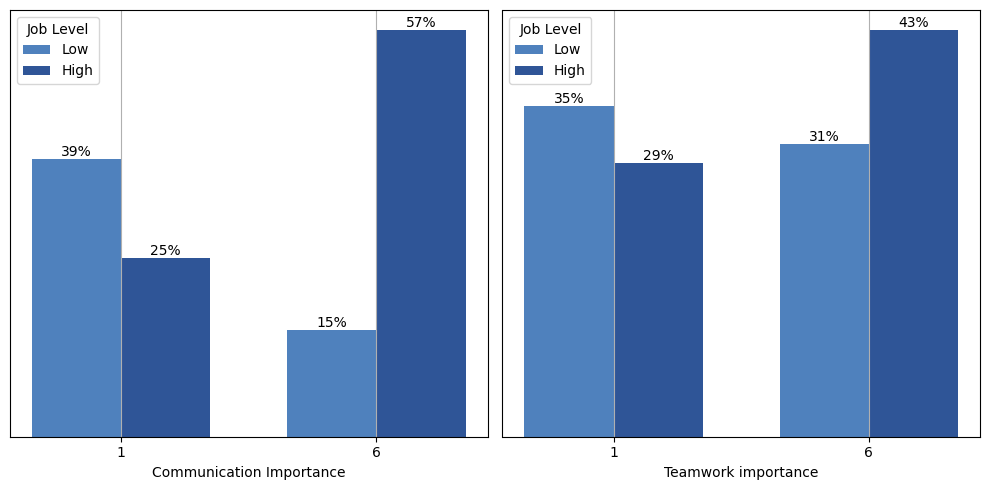By Sofía Ramos Pulido and Neil Hernández Gress
Is technical expertise the only thing you need to succeed in your career? Many believe that technical tools and knowledge are enough to succeed in their careers. However, this perspective is incomplete.
While technical expertise is crucial, recent studies suggest that soft skills—such as effective communication, teamwork, and problem-solving abilities—are crucial for advancing professional growth [1,2,3].
We used machine learning models to identify the key characteristics that help graduates reach high-level positions.
This study leveraged data from an alumni survey conducted during the 75th anniversary celebrations of Tecnológico de Monterrey. The initial aim was to measure the social and economic impact of EXATEC alumni, but the survey also included a question about soft skills, which machine learning models identified as a crucial factor in the respondents’ career advancement [4].
These artificial intelligence models found that among the most important characteristics for predicting higher-level positions are communication skills and teamwork.
Computing Science and Surveys
Machine learning models are computational tools capable of analyzing large datasets and automatically learning patterns.
The primary goal of these models was to extract the most relevant characteristics of graduates—such as skills and experience—that have the greatest impact on their likelihood of securing senior positions.
To achieve this, the model analyzed all available variables and selected those that had the most influence on predicting employment levels.
Result: Machine learning and statistical tools identify soft skills as a predictor of professional success.

Soft Skills
Graduates in higher positions (represented in dark blue) are significantly more likely to consider communication a crucial skill (57%) than those in lower-level positions, where only 15% assign it high relevance. A similar trend is observed with teamwork.
These data suggest that graduates in senior roles have a greater understanding and appreciation for interpersonal skills. This implies that recognizing and developing communication and teamwork abilities are closely linked to professional growth within organizations.
These are “processable” skills, meaning they can be developed and improved [8,9], and thus can be fostered during university education to increase students’ chances of success in the workforce.
The study also evaluated soft skills such as negotiation, innovation, and planning to understand their relationship with professional success. The results indicate that innovation is among the most significant variables for predicting higher employment levels.
However, its predictive power is modest, and no statistically significant differences were found across employment levels. Similarly, negotiation and planning skills showed no clear relationship with employment levels in the sample analyzed, suggesting that, while they may be related, the available empirical evidence does not support a definitive claim about their impact.
Referencias
- Mainert, J., Kretzschmar, A., Neubert, J. C., & Greiff, S. (2015). Linking complex problem solving and general mental ability to career advancement: Does a transversal skill reveal incremental predictive validity? International Journal of Lifelong Education, 34(4), 393-411.
- Gøtzsche‐Astrup, O., Jakobsen, J., & Furnham, A. (2016). The higher you climb: Dark side personality and job level. Scandinavian Journal of Psychology, 57(6), 535-541.
- MBA for Executives. Available online: https://executivemba.wharton.upenn.edu/top-executive-management-skills-needed-in-the-c-suite/martech-su-form-wrapper (accessed on 12 November 2024).
- Instituto Tecnológico y de Estudios Superiores de Monterrey. (2020). Economic and social impact of Tecnológico de Monterrey graduates in the world https://sar.itesm.mx/ranking_2020/75_years_impact.pdf
- Greenhaus, J. H., & Callanan, G. A. (2012). Career dynamics. Handbook of Psychology, Second Edition, 12.
- April Chang, W. J., & Chun Huang, T. (2005). The distinctive effects of earnings determinants across different job levels. The International Journal of Human Resource Management, 16(11), 2094-2112.
- Furnham, A., & Crump, J. (2015). Personality and management level: Traits that differentiate leadership levels. Psychology, 6(5), 549-559.
- Fallowfield, L., Jenkins, V., Farewell, V., & Solis-Trapala, I. (2003). Enduring impact of communication skills training: results of a 12-month follow-up. British journal of cancer, 89(8), 1445-1449.
- Shuman, L. J., Besterfield‐Sacre, M., & McGourty, J. (2005). The ABET “professional skills”—Can they be taught? Can they be assessed?. Journal of engineering education, 94(1), 41-55.
.
Text based on this scientific article: Ramos-Pulido, S., Hernández-Gress, N., & Torres-Delgado, G. (2023, February). Analysis of soft skills and job level with data science: A case for graduates of a private university. In Informatics (Vol. 10, No. 1, p. 23). MDPI.
Authors
Sofía Ramos Pulido. Ph.D. student in Computer Science at Tecnológico de Monterrey, Monterrey campus.
Neil Hernández Gress. Professor and researcher at the School of Engineering and Sciences, Tec de Monterrey, in the Department of Computational Sciences. He currently serves as Director of Research in the Operations Directorate of the Vice Presidency of Research at Tec. His research focuses on data-driven decision-making and innovation systems and models. He is a member of the National System of Researchers.














